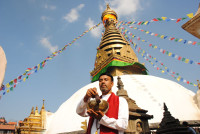Life & Style
Coping with culture shock
People are always in a hurry to leave Nepal but they don’t seem to enjoy living abroad too.
Raman Budhathoki
I was not a big fan of Kathmandu. I didn’t like its dusty roads, ungenerous landlords and the quality of life it provided me. I wanted to leave the city I could go someplace different with cleaner roads, healthier AQI and better opportunities. That is why I moved to the US some time ago. Although the New World has been very kind to me, I’m starting to miss home.
Naturally, the people who have recently come abroad miss their home more than others. Let me explain why by introducing a term that you might already be familiar with: ‘culture shock’. Culture shock can be understood as shifting from a familiar culture to an alien one. The effects when a person has to adapt to a dissimilar and novel social or cultural setting could range from nervousness, surprise and disorientation to uncertainty and confusion. In addition, culture shock might include experiences of trauma about being separated from people close to us.
There are four stages of culture shock: the Honeymoon, Uncertainty and Doubt, Orientation, and Acceptance. The Honeymoon stage is a period when we have just arrived overseas and are beginning to set up our apartments. Everything seems new and interesting and we feel excited about all the differences we perceive. You haven’t started missing home yet. You do, however, search for similarities between your home country and the host country, all the while appreciating the differences between the two.
The second stage of culture shock is the Uncertainty and Doubt phase which kicks off after you have unpacked all your belongings and are starting to get used to the new life. You suddenly start feeling frustrated or annoyed with the strangeness of the new culture and the way things are done there. You begin to compare and contrast the two cultures and deduce that the latter is inferior to the former in many different ways, including food, language, etc. You may start to feel uncertain about your choice to leave your home country and lonely when you realise your support systems are not as accessible anymore.
The Uncertainty and Doubt phase is followed by the Orientation state, which is the first step towards adaptation and acceptance. This is when you start comprehending why things are done differently. You start to respect the culture and traditions whether you like them or not and begin to feel a little more comfortable in your new environment. You gradually feel more confident and prepared to face any problems that might arise. However, you should know that the phases of culture shock are not straightforward. You might not even arrive at the orientation state in one go.
The last phase of culture shock is Acceptance. Here, you will have a different attitude towards the opposing cultures and will be able to operate in both cultures. You will be able to espouse the new culture, and feel comfortable, confident and independent.
Life abroad is not just about posting weekend pictures or party stories on social media. Not-so-glamourous things people go through on a regular basis include maintaining relationships, finding a balance between work and study, taking good care of health, etc. Having said this, I wanted to accentuate a few things people in Nepal could do to help their loved ones in foreign lands adapt.
The foremost thing is to acknowledge the time zone differences. You should stop expecting people to communicate at a time that is only convenient for you and be willing to talk with them at some odd hours. You should also avoid petty arguments and make the most out of the limited time you have to communicate. This will enable them to focus more on their priorities while feeling emotionally supported.
People are always in a hurry to leave Nepal after they graduate but they don’t seem to enjoy the time abroad too. It will definitely feel great to hear Good Day wishes from bus drivers in the West but deep inside you will be searching for those dull streets of Koteshwor and the crowds of people in front of Kathmandu Mall, in other words–The Nepali Connection, during that interaction.
In my opinion, studying abroad is a rewarding experience that everyone should experience at some point in their lives. It teaches us to discern what is on the other half of the globe and live as a global citizen.




 9.6°C Kathmandu
9.6°C Kathmandu










